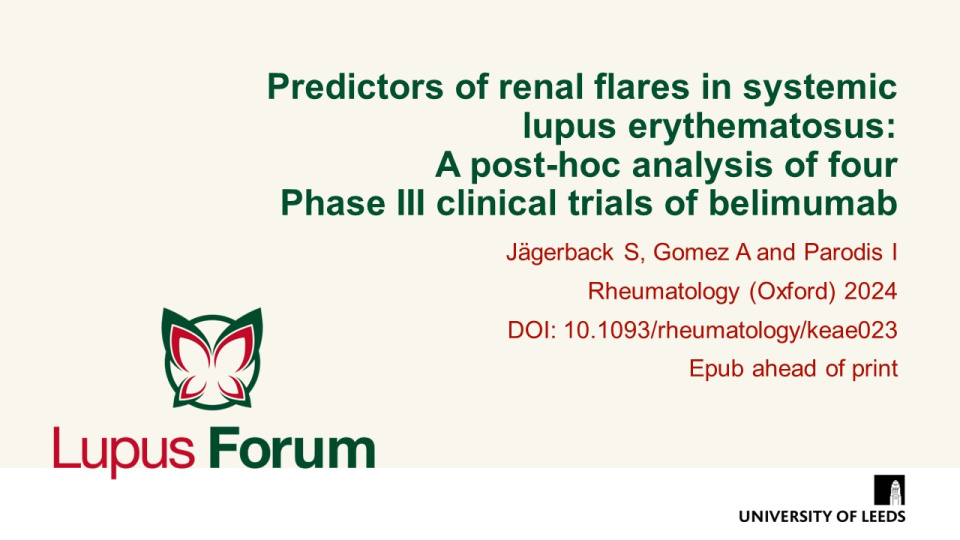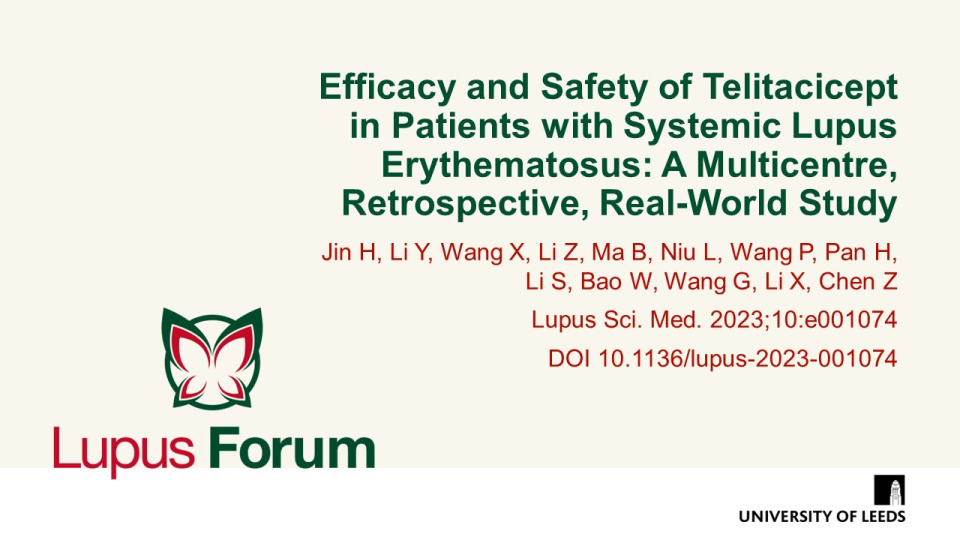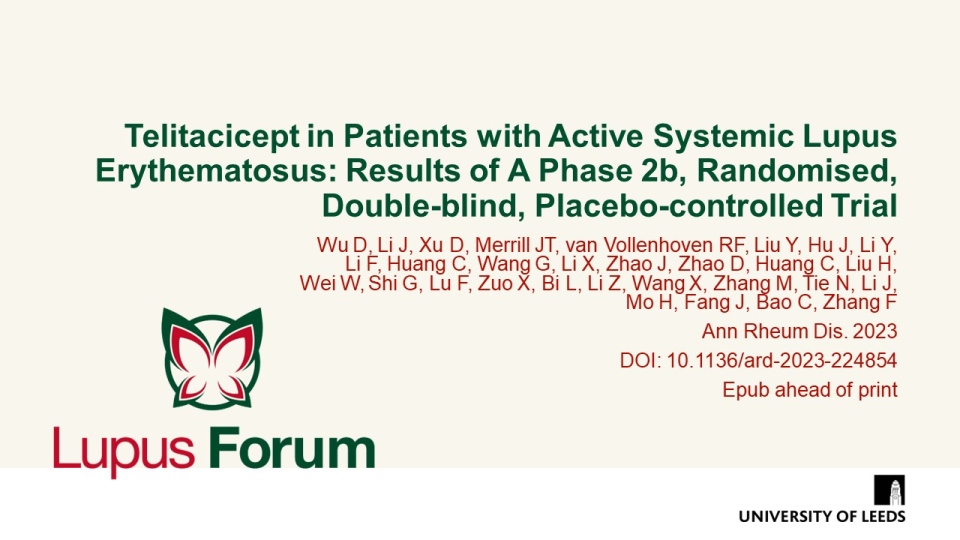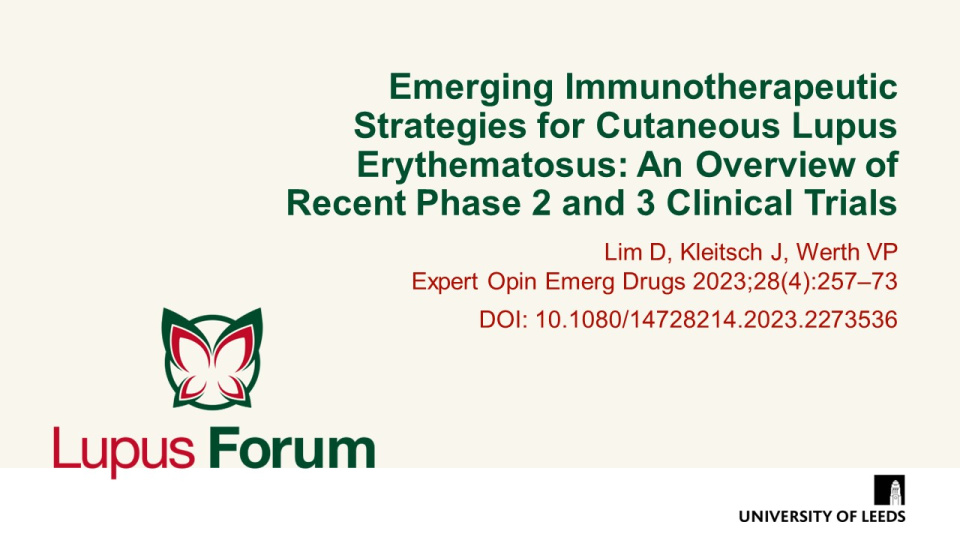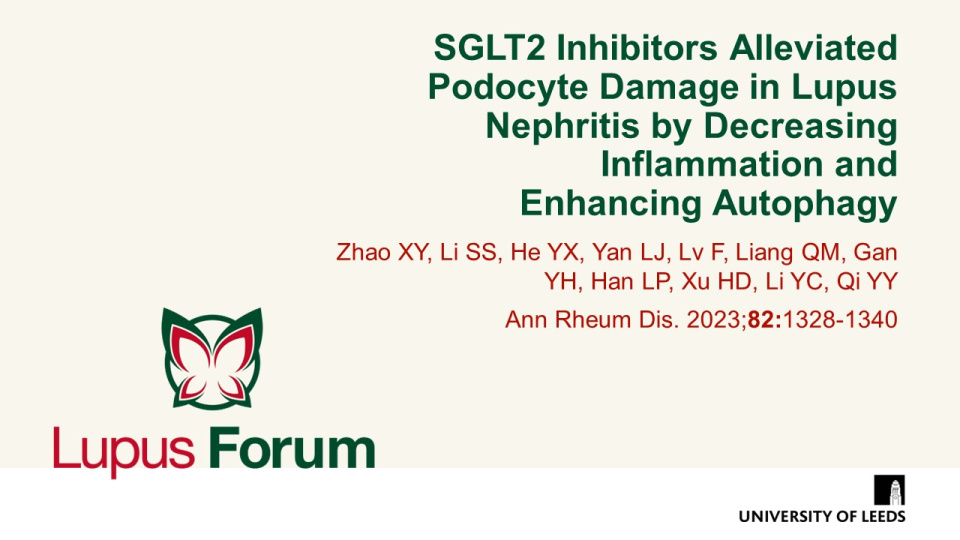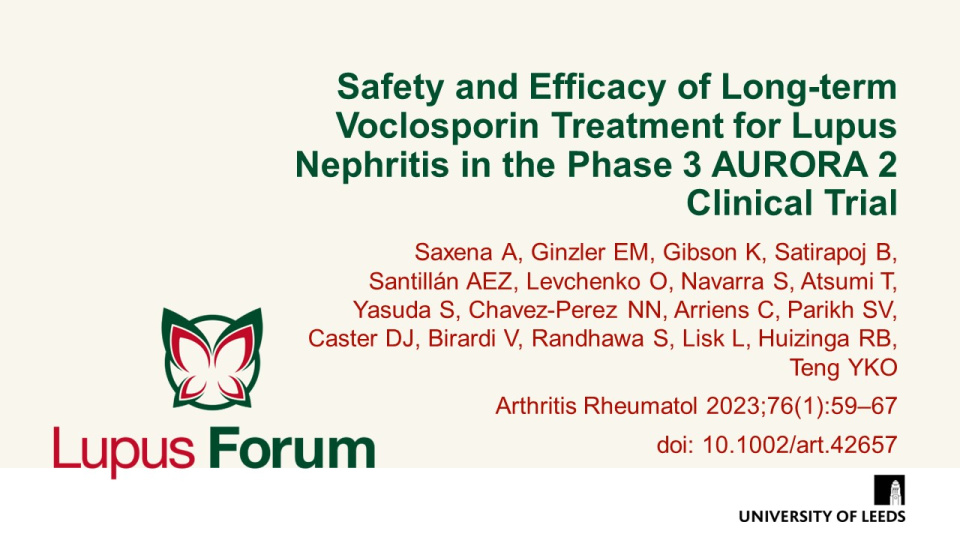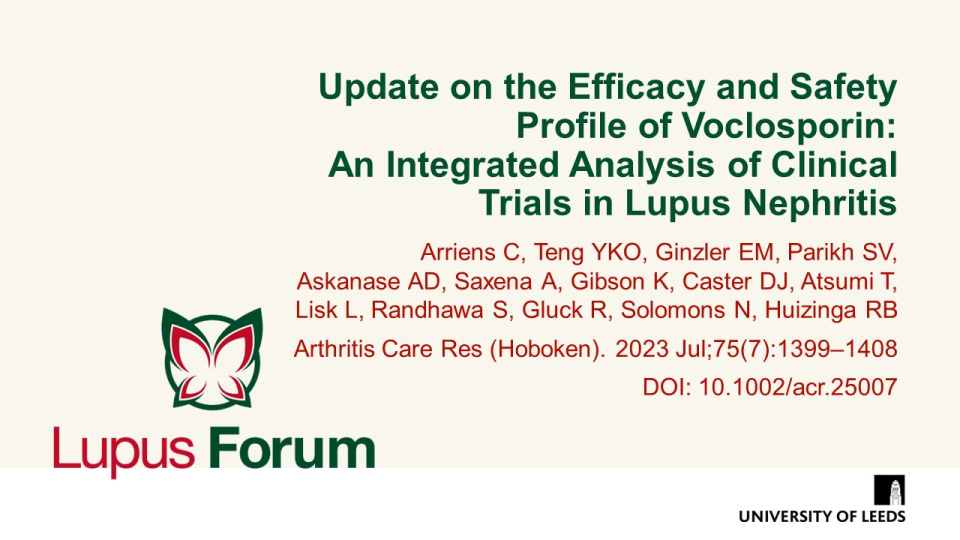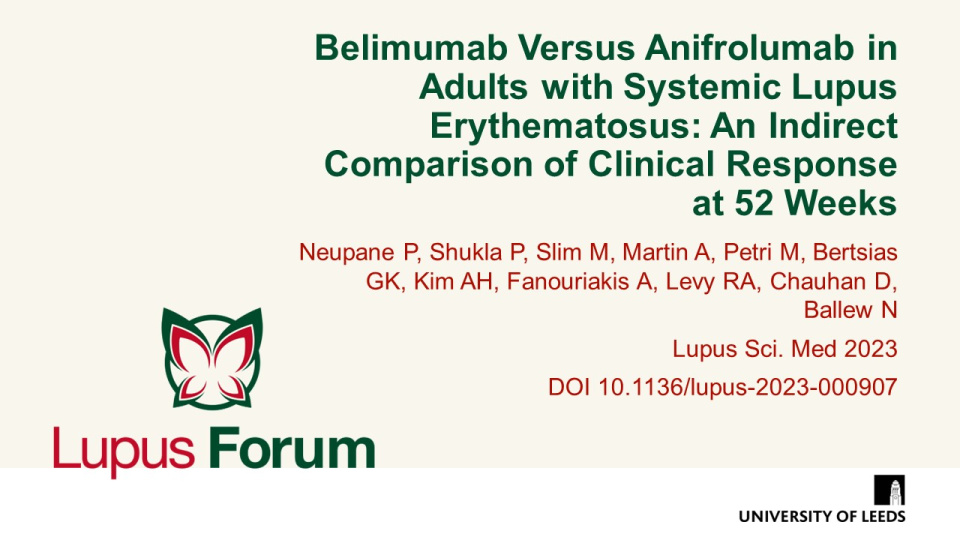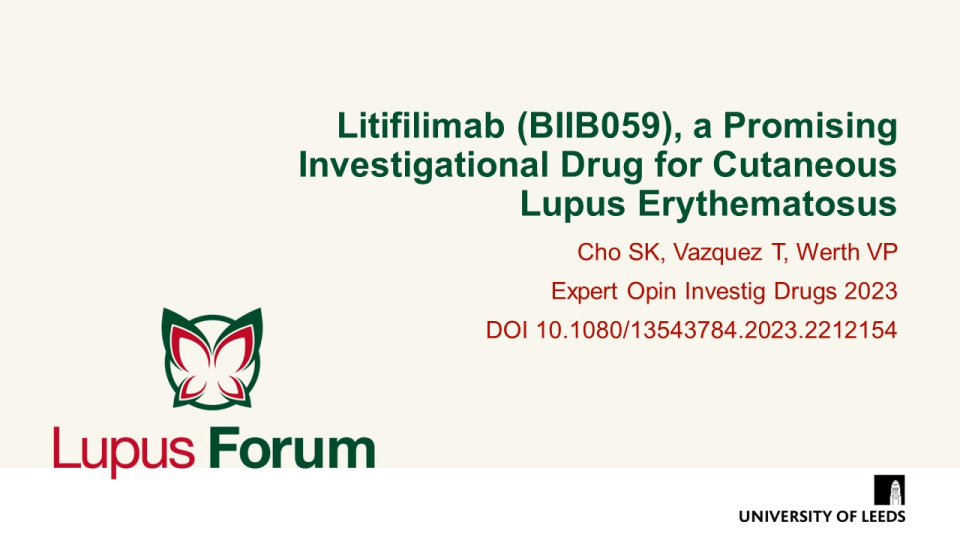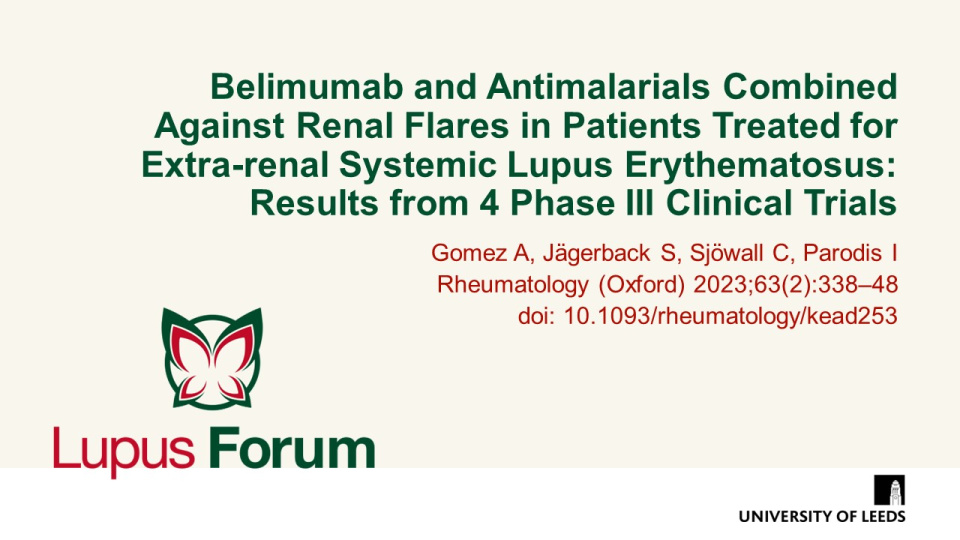Publications
Find coverage of the latest original articles on Lupus, focusing on those with data on therapeutic interventions and those that have clinical impact.
Predictors of Renal Flares in Systemic Lupus Erythematosus: A Post-hoc Analysis of Four Phase III Clinical Trials of Belimumab
Rheumatology (Oxford) 2024 DOI: 10.1093/rheumatology/keae023 Epub ahead of print
High baseline proteinuria levels, hypoalbuminaemia, and C3 consumption were associated with
renal flare development. Renal flares remain common in patients with SLE, however causative factors are still largely unknown. Jagerback, et al. conducted a post-hoc analysis of pooled BLISS trial data to identify predictors of renal flares.
Keywords:
Efficacy and Safety of Telitacicept in Patients with Systemic Lupus Erythematosus: A Multicentre, Retrospective, Real-World Study
Lupus Sci. Med. 2023;10(2):e001074 DOI 10.1136/lupus-2023-001074
In this study, telitacicept add-on therapy demonstrated desirable real-world safety and efficacy profiles for the management of SLE, LN, and patients with haematological abnormalities.
Telitacicept in Patients with Active Systemic Lupus Erythematosus: Results of A Phase 2b, Randomised, Double-blind, Placebo-controlled Trial
Ann Rheum Dis. 2023; DOI: 10.1136/ard-2023-224854
This Phase 2 trial demonstrated the efficacy and acceptable safety profile of telitacicept in patients with SLE. The safety profile of telitacicept was comparable with that observed in clinical trials of other B cell-targeting agents.
Keywords:
Emerging Immunotherapeutic Strategies for Cutaneous Lupus Erythematosus: An Overview of Recent Phase 2 and 3 Clinical Trials
Expert Opin Emerg Drugs 2023;28(4):257–73 DOI: 10.1080/14728214.2023.2273536
Current treatments for refractory CLE are insufficient, often leading to suboptimal disease control, and demanding escalated therapies associated with systemic toxicities. However, recent Phase 2 & 3 trials offer promising results, suggesting new therapeutics approved for CLE are on the horizon.
SGLT2 Inhibitors Alleviated Podocyte Damage in Lupus Nephritis by Decreasing Inflammation and Enhancing Autophagy
Ann Rheum Dis. 2023 DOI: 10.1136/ard-2023-224242
Data revealed a renoprotective effect of SGLT2 inhibitors by reducing proteinuria and preserving renal function in the murine MRL/lpr lupus model.
Safety and Efficacy of Long-term Voclosporin Treatment for Lupus Nephritis in the Phase 3 AURORA 2 Clinical Trial
Arthritis Rheumatol. 2023;76(1):59–67 DOI: 10.1002/art.42657
AURORA 2 demonstrated the safety and tolerability of continued administration of voclosporin over 3 years of treatment in patients with LN.
Keywords:
Update on the Efficacy and Safety Profile of Voclosporin: An Integrated Analysis of Clinical Trials in Lupus Nephritis
Arthritis Care Res (Hoboken). 2023 Jul;75(7):1399–1408 DOI: 10.1002/acr.25007
Pooled analysis of data from the AURA-LV phase 2 and AURORA 1 phase 3 trials of voclosporin in patients with active LN demonstrated that significantly more patients achieved a complete renal response at 1 year in the voclosporin than the control group (p<0.0001), with no observation of new safety signals.
Belimumab Versus Anifrolumab in Adults with Systemic Lupus Erythematosus: An Indirect Comparison of Clinical Response at 52 Weeks
Lupus Sci. Med 2023;10:e000907 doi 10.1136/lupus-2023-000907
This retrospective study by Neupane, et al. compared belimumab and anifrolumab efficacy at 52 weeks in SLE patients. It concluded that belimumab and anifrolumab have equal efficacy, but further studies would be needed for specific patient demographics.
Litifilimab (BIIB059), a Promising Investigational Drug for Cutaneous Lupus Erythematosus
Expert Opin Investig Drugs 2023;15:1-9 doi 10.1080/13543784.2023.2212154
Cho, et al. discuss the current challenges in the approval of CLE drugs and suggest outcome measures that could streamline the process. They also discuss the pharmacodynamics of litifilimab and the current status of clinical trials.
Belimumab and antimalarials combined against renal flares in patients treated for extra-renal systemic lupus erythematosus: results from 4 phase III clinical trials
Rheumatology (Oxford) 2023;63(2):338–48 doi: 10.1093/rheumatology/kead253
The protection conferred from belimumab against renal flare development in patients treated for extra-renal SLE appears enhanced when administered along with antimalarials (AMA).


